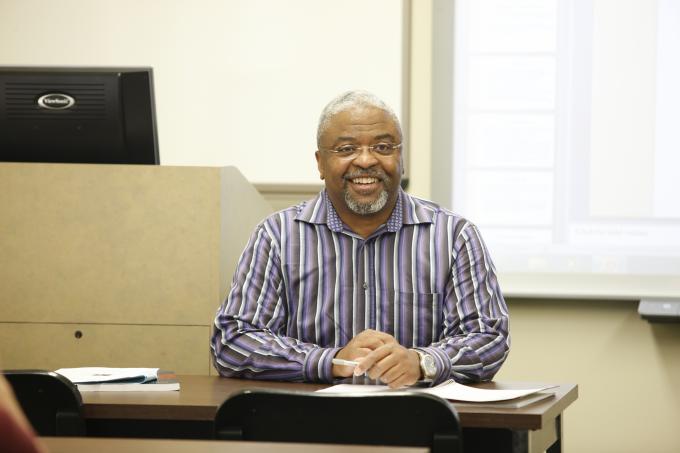Professor Stanley Denton Paves the Way for Black Male Teachers
 The Point
The Point
Fall 2016
When the popular website Slate.com wanted to explore why there aren't more African-American male teachers, they sought out Stanley Denton, Ph.D., associate professor of education at Point Park, for answers.
Denton has been a leader in the formation of the Black Men Teaching Initiative, a Western Pennsylvania-wide effort aimed at increasing the percentage of African-American males enrolled in college education programs from one percent to five percent over the next three years. It's an aggressive goal, but one that Denton believes is entirely possible.
Collaborative Effort
According to the Slate article, Pennsylvania's effort at increasing black male teachers in the classroom is one of a handful of similar initiatives across the country aimed at addressing what the article's author Dani McClain called "a national problem." "The Pennsylvania schools' program could be particularly helpful because the mismatch in Pittsburgh's public schools is wide. While just over half of the 26,000 students are black and one-third are white, according to data from 2014, 85 percent of the district's teachers were white and 14 percent were black," reported McClain. Addressing gaps like this is a major goal of the program.
Related Links
- School of Arts and Sciences
- Department of Education
- College Now Program
- Request Information
As Denton points out, Point Park can't do it alone, which is why faculty and staff from other nearby universities, including Indiana University of Pennsylvania, California University of Pennsylvania and the Community College of Allegheny County, are involved in the effort. Last May, Point Park hosted about 100 high school students for the "Ever Consider Teaching?" conference focused on the need for more black male teachers in America's schools. Reaction to the conference was uniformly positive, especially among the younger attendees. Participant Emanule Cargile, a junior from Propel Andrew Street, said, "It was a powerful experience. They were passing the baton to our generation."
College Now Opportunities
In addition to the ambitious goals of the Black Men Teaching Initiative, Denton spearheads College Now, a dual enrollment collaborative program that lets qualifying students earn up to 30 credits at a significantly reduced tuition rate during their junior or senior years of high school. Students participating in the College Now program can receive guidance and mentorship from faculty and advisors, and as an added incentive, those high school students who decide to enroll in College Now and major in education are given preference in the admission process.
Denton was a natural choice to head this program. In his former position as program officer for multicultural education in the Pittsburgh Public Schools, Denton created a national award-winning model program for incorporating diversity across the curriculum. A frequent seminar leader and speaker on diversity, educational issues and conflict resolution for community groups, national conferences not-for-profit organizations and business groups throughout the United States and in Africa, Denton is also active in numerous civic and community affairs, serving on the Duquesne, Pa. School District Board of Control. He is also involved in mentoring middle school youth through the Mt. Ararat Baptist Church Male Mentoring Project.
Education Changes Lives
Darlene B. Marnich, Ph.D., professor and chair of the Education Department in the School of Arts and Sciences, puts Denton's efforts into the simplest of terms. "Stanley believes that education can change lives."
"In recent years, the state is not certifying nearly as many teachers as it did 10 years ago. Therefore, with the fewer number of graduates, and a higher number of teacher retirements, our students are getting jobs when they graduate." With Denton's efforts, she adds, "the hope is that many of those teachers will be black males and role models for our children."
Text by Barbara Vilanova
Photo by Ian Bradshaw
The Point is the magazine of Point Park University

